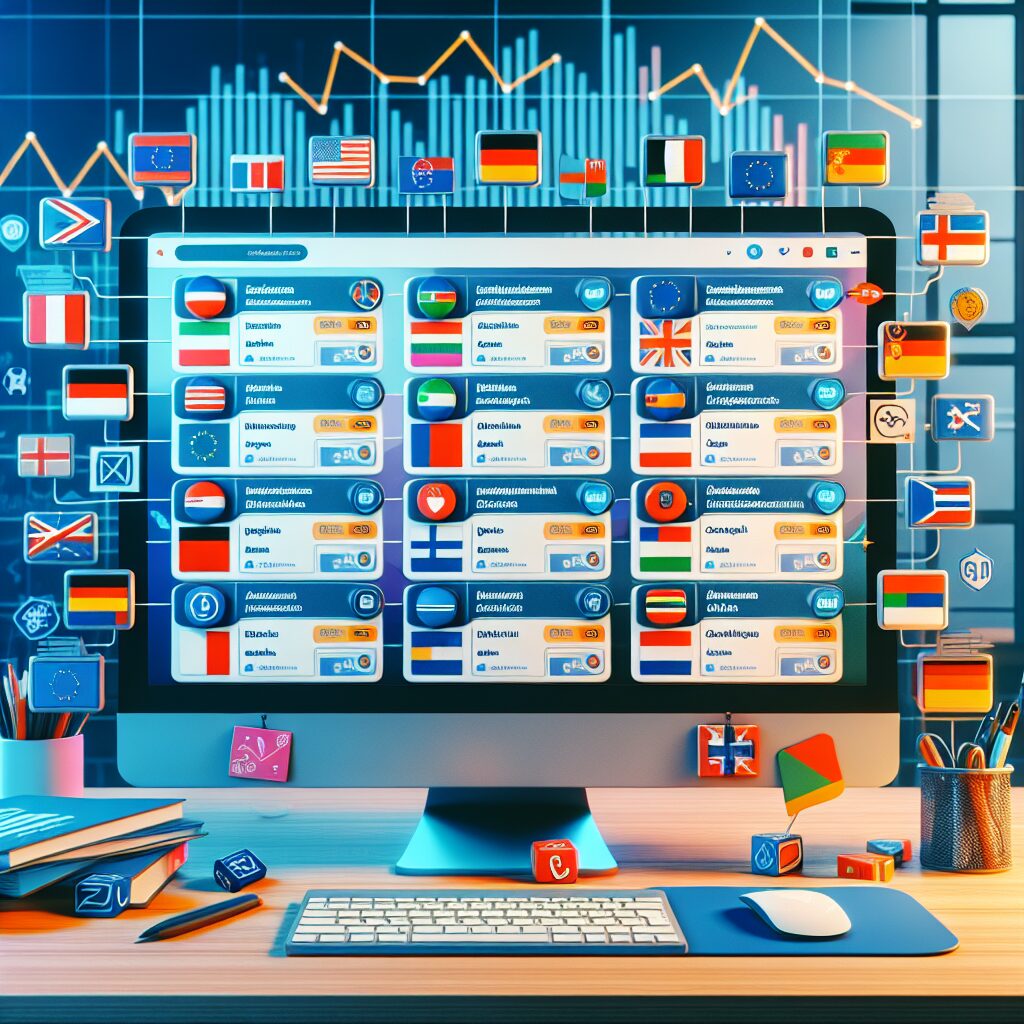About eldris
At Eldris, we automate SEO, multilingual site expansion, and EU compliance for brands scaling across Europe. Our AI-powered platform handles everything from content publishing to regulatory docs—so you don’t have to.
In This Article
- Use E-commerce SEO fundamentals to create a scalable and indexable store architecture.
- Deploy Eldris AI to automate keyword research and optimise metadata at scale.
- Improve product page performance with dynamic content and rich snippets.
- Ensure your store loads fast, works flawlessly on mobile, and meets Google’s technical guidelines.
- Leverage international SEO tools within Eldris to reach new markets with translated content.
- Use internal linking and structured data to enhance discoverability and user guidance.
- Monitor all SEO changes with real-time analytics and predictive alerts from Eldris.
- Integrate content strategy and automation to stay competitive in search rankings.
1. Understand Core SEO Fundamentals for E-commerce
Foundational SEO Techniques
E-commerce SEO is not just a trend; it’s a vital component of digital success for online retailers. At its core, it encompasses a set of practices designed to make your online store more visible in organic search results. By understanding SEO fundamentals, you lay the groundwork for scalable search traffic. Basic principles such as keyword optimisation, maintaining clean URLs, prioritising crawlability, and boosting on-site relevance are foundational yet often overlooked.
Start by ensuring every category and product page targets a specific keyword. Use descriptive titles, headers, and meta descriptions, and always write for people first. Avoid duplicate content—a common issue for large catalogues—by utilising canonical tags and unique product descriptions. Additionally, ensure robots.txt and XML sitemaps correctly guide search engine crawlers to your important content.
Implement structured data across your site. Use schema.org markup to tag product names, prices, availability, reviews, and more. This not only improves visibility in Google’s rich results but also encourages higher click-through rates.

2. Optimize Site Structure Using Eldris Insights
Navigation and Architecture Best Practices
Site structure is one of the most overlooked aspects of E-commerce SEO, yet it can significantly affect a site’s performance. A poorly structured site confuses both users and search engines. With Eldris, e-commerce businesses can analyse complex site architectures using AI-driven heatmaps and user-flow simulations to redesign for maximum crawlability and usability.
Adopt a flat site architecture where every important page is accessible within three clicks from the homepage. Organise categories logically, and use breadcrumb navigation for enhanced user orientation and SEO-friendly internal linking. Always include clear HTML static links in your menu for consistent crawling.
Eldris can provide real-time audit data revealing dead ends, excessive crawl depth, or underperforming URLs. Use these insights to reconfigure navigation paths and consolidate or redirect thin pages. This ensures your crawl budget is invested wisely and your visitors are guided intuitively through the purchase journey.
“Using Eldris to optimise our e-commerce architecture cut bounce rates by 23% and improved indexed page discovery within weeks.”
3. Automate Keyword Research with Eldris AI
Keyword research remains an essential pillar of E-commerce SEO, but doing it manually for hundreds or thousands of products is incredibly labour-intensive. Eldris eliminates this burden using AI-driven search analysis, buyer intent clustering, and real-time competition scoring to surface strategic keyword opportunities.
Begin by feeding your product inventory and existing site structure into Eldris. The platform will segment your offerings and generate optimised keyword clusters tailored for informational, navigational, and transactional queries. Eldris further identifies long-tail keywords, seasonal trends, and competitor keyword gaps you can exploit.
Integrate the suggested keywords naturally into your product titles, descriptions, meta data, and alt text. Avoid keyword stuffing — Eldris ranks suggestions by relevance and search volume, so you’ll only target terms that matter. This foundation means every product page is optimised for intent-matching discovery on search engines.
4. Enhance Product Page SEO Performance
Product pages are the DNA of your e-commerce site. Poorly optimised product pages waste high-potential traffic. Eldris assists in evaluating product page performance using AI-scored relevance metrics, engagement tracking, and on-page content audits.
Ensure each page includes an optimised H1 tag, at least one H2 subheading using your target keyword, and a unique, richly written description. Avoid using supplier descriptions; create custom content that highlights features and benefits. Incorporate buyer FAQs and user-generated content like reviews to expand the semantic scope.
Using Eldris, implement dynamic content blocks that populate personalised recommendations based on browsing history. These not only boost engagement but can be crawled as supplementary content, enhancing relevance signals for similar product or category searches.
5. Implement Fast Load Times and Mobile Usability
Load speed and mobile usability are both ranking factors and crucial conversion drivers. Slow, clumsy pages lead to abandoned carts and higher bounce rates. Eldris integrates PageSpeed APIs and performs simulated load tests to surface specific elements hurting performance.
Compress images without sacrificing quality, use lazy loading for off-screen assets, and minify JavaScript and CSS wherever possible. Move to a fast hosting provider with CDN capabilities for global reach.
Mobile usability should be a priority, not an afterthought. Apply responsive design principles and accommodate touchscreen behaviours. Eldris evaluates mobile heatmaps to identify usability issues — for example, unclickable buttons or text too small to read. Fixing these improves both rankings and conversions.
6. Use AI to Generate Optimized Meta Tags
Too many e-commerce sites neglect the power of well-optimised meta tags. Title tags, meta descriptions, and even social preview tags influence how your pages appear in search results. Eldris can auto-generate hundreds of these tags at scale using semantic text prediction and page-specific contextual cues.
Rather than using the same boilerplate templates, Eldris produces diversified yet optimised title and description formats. These not only include your top keywords but also incorporate persuasive CTA elements that increase your search click-through rate. The result? Better rankings and higher engagement before the user even lands on your site.
For larger catalogues, Eldris offers bulk editing functionalities. You can build pattern-based templates using variables like {Brand}, {Model}, or {Feature}, then customise them with machine learning-assisted tone adjustments. This reduces manual input while elevating SEO precision.
7. Leverage Eldris for International SEO and Translation
Going global presents both opportunities and challenges for e-commerce businesses. International SEO involves adapting your site to rank in different countries and languages. Eldris streamlines this entire process through built-in localisation engines and hreflang automation modules.
Begin by tagging your language and regional preferences correctly using hreflang attributes. Eldris ensures these are consistently applied across your site and integrates with multilingual CMS plugins for seamless execution.
Translation is another friction point. Automated tools often produce awkward copy that can deter users and search engines alike. Eldris, however, uses context-aware neural translation models designed specifically for commercial terminology and regional dialects. Combined with native-speaker proofreading capabilities, you get SEO-optimised and culturally appropriate content across your global store versions.
International SEO also relies on geo-targeted keyword research. Eldris automatically adjusts keyword strategy based on local search habits and SERP competition. This ensures your localisation is meaningful, not merely literal.
8. Streamline Internal Linking and Rich Snippets
Internal linking is vital for guiding both users and search engines through your content hierarchy. An optimised internal linking strategy helps distribute ranking power, surface underperforming pages, and reduce orphan pages. Eldris evaluates link value profiles and provides actionable suggestions via heat-mapping navigational flows and backlink distribution models.
Use descriptive, keyword-rich anchor text when linking between categories, blog articles, and product pages. Ensure every major page has incoming and outgoing links. Avoid using generic links like “click here”. Instead, craft links that provide SEO context and entice interaction.
For advanced E-commerce SEO, enable rich snippets by applying structured data for reviews, pricing, stock status, and more. Eldris includes a testing sandbox for validating JSON-LD and visualising how your listings will appear in search results. Proper rich snippet markup increases CTR and enables your site to visually stand out among competitors.
For additional information on advanced content integration, refer to Learn more about SEO Automation for E-commerce.
9. Monitor SEO Progress with Real-Time Analytics
SEO is not a “set it and forget it” discipline. Performance needs to be monitored, measured, and adapted over time. Eldris consolidates live analytics dashboards, keyword rankings, conversion funnel metrics, and engagement tracking into one manageable interface.
Unlike other static reporting tools, Eldris uses predictive modelling to forecast shifts in search behaviour and rankings. You’ll receive automated alerts for position drops, crawl errors, indexing issues, and traffic anomalies, allowing you to react before performance is heavily impacted.
Use the insights from Eldris to A/B test changes to product pages, meta tags, or internal linking strategies. Measure changes not just by clicks, but by quality of traffic and revenue impact. This approach ensures you’re not optimising in a vacuum but aligning SEO actions with tangible business results.
For compatible KPIs and benchmarking templates, visit Read a related article.
10. Combine Content Strategy with Automation Tools
Content continues to be king in SEO, but how you create, publish, and optimise it matters just as much. Manual content production processes are slow, inconsistent, and resource-heavy. Eldris solves this with a full-scale content automation suite that includes AI copywriting, topic clustering, and duplicate content detection.
Build your content calendar around keyword clusters and topic groupings identified via Eldris. Write with intent-driven structures, and ensure every article supports a product or category conversion objective. Eldris’ AI copy assistant can rapidly generate SEO-optimised blog posts, FAQ sections, and even category descriptions tailored to various stages of the buyer’s journey.
Additionally, leverage the content syndication and schema tagging features. These enable content reuse across multiple on-site locations without SEO penalty—perfect for seasonal product rollouts or promotional campaigns.
Explore more content strategy advice from industry experts at Explore 10 killer e-commerce SEO tips.
Conclusion: Scale Your Online Growth with Eldris
[CONCLUSION_CONTENT]
Great guide on 10-tips-for-optimizing-e-commerce-websites-with-eldris – Community Feedback
What are the most effective SEO strategies for e-commerce sites?
The most effective strategies include optimizing product pages, improving site structure, automating SEO tasks with platforms like Eldris, and building high-quality backlinks.
How does Eldris help automate e-commerce SEO?
Eldris uses AI to streamline SEO processes such as keyword research, on-page optimization, and multilingual expansion, saving time and improving accuracy.
Can optimizing my e-commerce website increase sales?
Yes, optimizing your website for SEO improves visibility, attracts targeted traffic, and can significantly boost sales and revenue.








